After a long shift filled with emergencies, endless notes, and the sound of monitors that never stop beeping, most doctors don’t need motivation — they need recovery.
But for many of us, “switching off” feels almost impossible. We go home physically drained yet mentally wired, replaying patient cases or worrying about the next day’s schedule.
If that sounds familiar, you’re not alone. I used to believe recovery meant sleeping more or doing nothing. But over time, I learned that real recovery starts with intentional small habits that tell your mind and body it’s safe to rest.
In this post, I’ll share simple, science-backed evening routines that helped me (and many colleagues) unwind, reset, and sleep better — even after unpredictable hospital shifts.
Why Doctors Struggle to Recharge After Work
Being a doctor abroad or in any busy hospital setting means carrying emotional and cognitive load all day.
We face:
-
Mental fatigue from constant decision-making
-
Disrupted sleep cycles due to irregular or night shifts
-
Emotional exhaustion after difficult patient encounters
-
The “always on” mindset that makes us feel guilty for resting
When these stressors pile up, rest stops feeling like a reward and starts feeling like another task. That’s why the key to recharging isn’t doing more — it’s doing less, but intentionally.
(📖 Related post: How I Manage Stress as a Doctor Working Overseas)
1. Create a “Transition Ritual” After Work
Before you even think about what to do at home, start the recovery process the moment you leave the hospital.
A transition ritual acts as a mental bridge between your work life and personal life.
Try this three-step formula:
-
Change your environment: The simple act of changing clothes when you reach home signals your brain that the workday is over.
-
Wash away the stress: Take a quick shower — even 2 minutes of warm water helps lower cortisol levels.
-
Move before you scroll: Take a short walk or do light stretching before checking your phone. It clears residual stress hormones and releases endorphins.
🎧 Optional boost: Play calming music or light a candle with lavender or sandalwood scent while you unwind.
Sleep hygiene / bedtime routine tips (Cleveland Clinic)
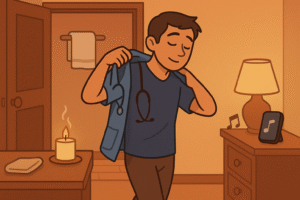
2. Practice “Mental Detachment” From Hospital Life
You can’t rest if your mind is still in the ward.
Doctors often bring emotional baggage home — the case that went wrong, the patient you couldn’t save, or tomorrow’s rounds.
Here’s how to let go:
-
Journaling: Write down any lingering thoughts, lessons, or unresolved worries. Getting them on paper frees up mental space.
-
Gratitude reflection: End each day by noting one positive moment — it could be a smile from a patient or teamwork during a hectic shift.
-
Closure ritual: Say a quiet affirmation like, “My workday is done. I’ve done my best.”
These small steps train your brain to separate you the doctor from you the human being.
Gratitude’s health benefits & longevity (Harvard Health)
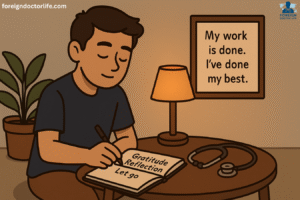
3. Nourish Your Body — Not Just Fill It
After duty, it’s tempting to grab junk food or skip dinner entirely. But how you refuel plays a major role in recovery.
-
Opt for light, balanced meals: soups, lean protein, and vegetables.
-
Avoid heavy carbs or caffeine close to bedtime.
-
Rehydrate — dehydration is common among doctors who barely sip water during shifts.
Try a calming drink before bed: chamomile, ginger, or warm milk with turmeric.

4. Wind Down Screen Time and Blue Light
Scrolling through your phone may feel relaxing, but blue light delays melatonin release — the hormone that helps you sleep.
Try this instead:
-
Switch to warm lighting an hour before bed.
-
Use digital wind-down mode or airplane mode after 10 PM.
-
Listen to guided meditation or soothing music rather than watching videos.
Apps like Insight Timer, Headspace, or Calm can help with guided relaxation.
Blue light & sleep (Sleep Foundation)
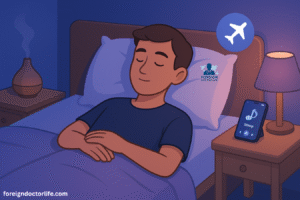
5. Build a Short, Realistic Night Routine
A perfect routine isn’t one that looks aesthetic — it’s one you’ll actually stick to, even on the busiest days.
Here’s a 10-minute sample evening routine you can try:
-
Warm shower (2–3 minutes)
-
Herbal tea or hydration
-
3 lines of journaling or gratitude reflection
-
Light stretching or breathing
-
Dim the lights and sleep
This simple sequence trains your body to associate certain actions with winding down — just like washing your hands before surgery prepares your mind to focus.
6. Accept “Good Enough” Rest
Not every night will be perfect — and that’s okay.
Doctors often chase the ideal 8-hour sleep, but shift work doesn’t allow it. What matters more is quality rest.
-
Focus on consistent sleep times, even if shorter.
-
Use earplugs and blackout curtains to optimize sleep environment.
-
Short power naps can also reduce fatigue and improve cognition.
Remember: consistency beats perfection.
7. Micro Self-Care Rituals for Night-Shift Doctors
If you’re on rotating or night shifts, you can still build a mini version of this routine.
Try these micro-habits:
-
3-minute deep breathing before bed
-
Aromatherapy diffuser beside your pillow
-
Body scan meditation while lying down
-
Quiet gratitude reflection instead of journaling
These little actions anchor your mind when your schedule doesn’t.
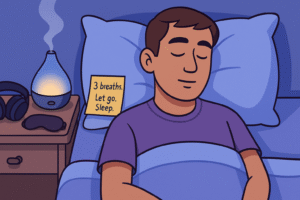
Key Takeaway: Rest Is a Professional Skill
The most successful and calm doctors aren’t the ones who work the longest — they’re the ones who recover the best.
Think of rest as part of your duty, not an indulgence. The better you recharge, the better you care for others.
“You can’t pour from an empty cup. The doctor’s first patient is themselves.”
🧭 Quick Summary Table
| Goal | Routine Habit | Benefit |
|---|---|---|
| Switch off from work | Change clothes, shower, light walk | Mental reset |
| Release mental load | Journaling, gratitude | Emotional clarity |
| Support recovery | Light, nutritious meal | Stable energy |
| Prepare for sleep | Limit screens, soft light | Better sleep |
| Sustainable rest | Simple night ritual | Consistency |
💡 Frequently Asked Questions
1. What’s the best evening routine for doctors working night shifts?
Focus on dimming lights, hydration, and breathing before sleep. Keep the routine short but consistent.
2. How can doctors relax after long hospital shifts?
Transition rituals, mindful showers, light walks, and detachment journaling work best.
3. What helps doctors sleep better despite irregular schedules?
A fixed wind-down ritual, blackout curtains, and avoiding screens an hour before bed.
🔗 Further Reading
🌙 Final Thought
No matter where you practice — whether in a busy city hospital or a quiet island clinic — your evenings are the bridge between exhaustion and energy.
Protect them.
Because when doctors rest well, everyone benefits — patients, families, and the doctor within.
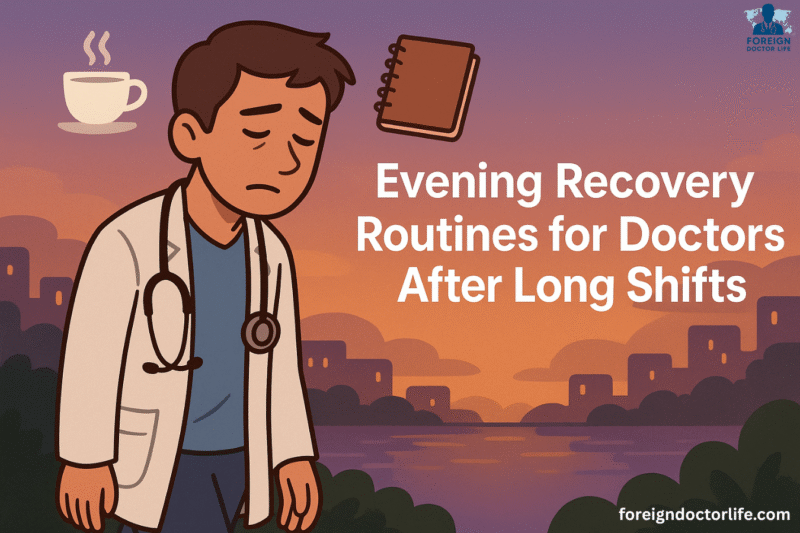









2 comments
Thanks .. Sir
Nice topic…